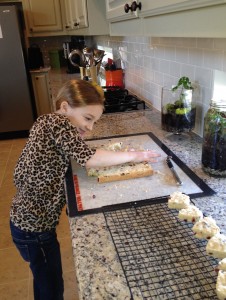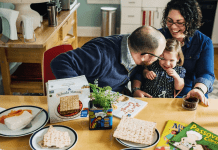
My seven year old probably knows more about cooking now than I knew when I graduated from college. For a variety of reasons, I didn’t learn to cook growing up. I stayed alive through college–although sometimes, I wonder how.
Eventually, living on my own in my mid-twenties, I started learning how to cook the food I had always liked to eat.
I remember thinking, who knew this cooking thing could be so enjoyable? But, that’s a story for another time. Today, cooking holds a very important place in my family life. We do a lot of cooking, talking about food, and sharing food as a practical way to love others.
I hope that my daughters will learn to cook in a natural way; that the kitchen will be an inviting place, where they will want to be. I hope they will learn young and not waste time playing catch-up as adults. I hope they will enjoy it, be social with it, and have the tools for life-long health.
When I observe what’s happening with my kids in the kitchen these days I think, whatever we’ve done here…I like it. My oldest can read recipes, double them, chop ingredients, measure, stir, and turn stove burners on and off. To a mama who couldn’t boil water in college, this all seems to be working out fantastically. Maybe my daughters will be better cooks than I? I’m OK with that possibility.
Below are a few ways I’ve approached cooking with kids:
Gathering food
- I involve them in my shopping trips. I let an infant/toddler drop the produce into bags, and I allow choices: what color apples do you want to buy today? I let them pick something new from the produce or meat section they’ve never tried before. This helps them learn the names of things; it encourages trying new things.
- Visiting a local farm provides a memorable way to learn about food. There are several working farms within driving distances of the metroplex like Ham’s Orchard where families and farmers connect through agritourism. Make time to go. You won’t regret it!
- Plant a garden. When kids are involved in growing their own food, it raises their curiosity and enthusiasm about it.
Meal Planning
- I ask my kids’ for their input in our meal plan. Ex: what’s one meal you’d like Mom to cook this week? Or, if we’re making soup, I might let them decide whether they want it to have a Latin or Asian flavor.
- My oldest loves chicken nuggets–such typical kid food it makes me want to cry. I could either fight it, or I could fine-tune a homemade version of it, so she can taste the difference between fast food nuggets and nuggets that contain identifiable ingredients.
- Make sure to check out all of our Meal-Planning tips here!
Cooking

- Start with baking. Kids can stir, shape, knead, and cut dough. Encourage them, and they will proudly point to their work.
- Expect messes. Yes, it’s going to take longer than usual. It’s OK. I’d rather have messes and inefficiency and a child who wants to be in the kitchen with me than stress and perfectionism and a child who feels like she is a burden.
- Knives: model how cutting is done, supervise, repeat. Start letting kids cut things like bananas and other produce with a small paring knife. Work up to peeling vegetables. Knife skills will benefit your child in the kitchen!
- Instead of saying “be careful” all the time, I try to say, “pay attention.” I don’t want my girls to be afraid. I just want them to be observant, and less likely to get hurt.
- My toddler wants to do everything her big sister does–not possible. But I’ve had success sitting her at the counter with plastic bowls and water, dough, utensils, etc. I also let her sprinkle random spices that don’t get used much. She loves it and talks about the “soup” she’s making. I’ve also brought a low table into the kitchen area to let her pretend cook there. Messy, yes–but worth it in the long run.
Manners
- I say over and over and over and over to my kids that they may not like a certain food right now…but they may grow to like it! I also tell them I don’t expect them to like everything. However, I do expect them to try, out of respect for the person who has put in the time and effort to make it. The great thing about involving kids in the process of growing, meal planning, shopping, and cooking is that they see for themselves the effort that goes into the meals. If they are not involved, how can they grasp that? Of course, my two-year-old doesn’t grasp it. But my seven-year-old is starting to.
I believe teaching kids to cook is a basic recipe. Spend time with them. Talk to them. Give them choices. Show enthusiasm for the process. Encourage what they do. Structured cooking classes for kids might be fun, but they aren’t necessary. You’ve got all the ingredients you need right at home.
Cooking with kids: what’s working for you?
This post was originally published on February 24, 2014.














“I say over and over and over and over to my kids that they may not like a certain food right now…but they may grow to like it!”
We always tell the kiddos that most humans are cautious when it comes to new foods. People generally acquire a taste for foods as they continue to try them over a period of time. For some people this takes a few tastes for others it may require 14-20 tastes.
I remember when my dad started trying sushi in his late 60’s. My brother was a sushi chef and he just kept making my dad try it over and over again even though my dad didn’t really care for it. Within a year, my dad started loving and craving sushi. 🙂
That’s great, Kelly! I mean, what a loss to not like sushi! I don’t know the science behind it…but I eat so many things now that I didn’t when I was younger, and I think it has a lot to do with repetition. I also think about a book I enjoyed called Animal, Vegetable Miracle by Barbara Kingsolver. In it, the daughter writes about how even in their family (in which they ate everything from scratch, all local foods, etc,) she still went through phases growing up when she rejected vegetables. She writes that she was later thankful that her parents fed her vegetables that maximized taste (organic, local, etc.) because the more tasteless varieties might not have eventually won her over. I don’t know. It’s interesting. Either way, I’m going to keep putting them on the plate and hope it works out! New foods: it’s what’s for dinner. 🙂
Love this!! I have 2 girls. Thanks for the tips! I want them to live cooking too. 😉
Thank you, Tara! It’s fun having two girls, isn’t it?